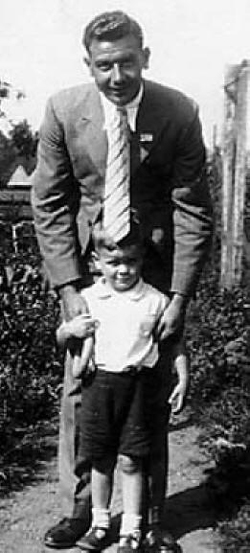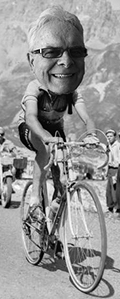Childhood memories on this Memorial Day
 Mon, May 27, 2019
Mon, May 27, 2019  The picture on the left is of me aged five with my Uncle David, he was my father’s younger brother. I was named after him.
The picture on the left is of me aged five with my Uncle David, he was my father’s younger brother. I was named after him.
It was 1941 during the early days of WWII, in the background of the picture you can see tents.
This was a British Army camp, and I have clear memories of watching a drill sergeant marching the new recruits up and down the road outside my house.
One day leaving home with my mother, the soldiers were lined up on the road three deep, standing to attention. As we walked by I said in a loud voice as kids often do,
“Mum, you see the one with the beard under his nose. (The drill sergeant had a mustache.) He’s the one who does all the shouting.”
There was audible laughter from some of the soldiers and as my mother hurried me away, I could hear the drill sergeant screaming at the men to be quiet.
We were living in a rural area in Southern England, having moved there in 1940 to escape the bombing in London. The war was something I didn’t understand at the time, but it was all I knew. My father was gone, fighting somewhere in Sahara Desert of North Africa.
Another clear memory I have is of early 1944 when the American soldiers arrived in preparation for the Normandy Invasion. They were everywhere, camped on every spare piece of land, including the same camp behind my house.
I was now eight years old and although they seemed like grown-ups to me, I realize today that most of these young army recruits were barely ten or twelve years older than I was at the time.
I remember they were always happy, laughing and constantly goofing around as teenagers will do.
They were so good to us kids, giving us candy and chewing gum every time the saw us. This was a huge deal as sugar was rationed and we had to get by on an allowance of only 2 oz. of candy a month.
We became used to the American soldiers being there, jeeps, trucks and even Sherman Tanks driving by all the time. Then one day, the first week of June 1944 the soldiers were gone. I went to school in the morning and they were there, I came home from school that afternoon and they were all gone.
It was a surreal experience that I didn’t understand at the time, any more than I understood anything else that went on during that period of my life.
Later when I became an adult, it had a profound effect on me. Because even to this day I can still see the faces of those young American boys, (Because that is what many of them were.) laughing, and goofing around.
Only now I realize that those same kids died in their thousands on the Beaches of Normandy and beyond.
I will never forget the sacrifice they made. A sacrifice not of their choosing. But one they made none the less so I would never have to do the same.




















Reader Comments (2)
Dave, I also have many bad memories of the war. I am a little older than thou and I lived through the bombing oin Yardey Birmingham England, in fact, had the German bomber had hit the button a second earlier I would not be her now. I will never forget the sound of the sirens and the drone of the Dornier Heinkels and Junker bombers going over the house. November 1940 they hit Coventry and to see the red sky with the city of Coventry ablaze something I will never forget On a lighter note there was a US Army base in Fillongley near Coventry that I would ride my bike to and ask the Yanks "Got any gum chum" They very friendly and would give me gum badges and spook forks etc that I kept for years. I have a photo of me and my best mate when we were about 7 yrs old, going to a bombed out house half a block from us a very close miss and looking through the wreckage.I had at home a arge colletion of incendiary bomd tali fins and shrapnel etc
Hi Dave.
Although those lads are gone they certainly aren’t forgotten by the French and other European countries under german occupation. I have relatives in Brittany France that are members of the British Legion, my Uncle an ex British army medic, attend numerous remembrance events and services throughout the year along with representatives of various military, local and national governments and ordinary folks. The nationalities of the lads at rest make no difference, the gratitude and appreciation of the locals are not just mere words as they tend to be elsewhere but are a deep part of who they are and culture. It isn’t unusual to drive through a French village similar to many others and come across a well preserved and looked after U.S. tank or other piece of wartime hardware.
Recently in our local newspaper in Victoria British Columbia, an article about the 75th Anniversary of the Canadian destroyer H.M.C.S. Athabaskan sunk off the coast of Brittany caught my eye, as a few years previously I was on the coast close to where it was sunk and took a picture of a plaque, which I had no idea how it got there. I sent the article along with the picture of the plaque to my relatives, who sent back a lot of pictures of the huge attended service held at the site of the plaque and the cemetery where the sailors that died were buried on the previous day.
The plaque for this nondescript Canadian destroyer sunk doing a routine job – guarding minelayers prepping for the D Day invasion was commissioned and paid for by a local schoolteacher circa 2004, who had 6 made and placed on the beaches close to the sinking, he thought it was important. The local students from 3 local schools ensure the plaques are always clean, look after the lads buried in the cemetery and attend the various services and ceremonies along with the locals.
This is an example of an everyday occurrence right across the countries of occupation with the same appreciation in this example is extended to all. The lads that you recall Dave wherever they are at rest are in very good hands, are part of the history and culture and certainly haven’t been forgotten.